Maru
Sprite Anti-Fog Junior-Schutzbrille - Rosa und Blau
Sprite Anti-Fog Junior-Schutzbrille - Rosa und Blau
Verfügbarkeit für Abholungen konnte nicht geladen werden
Diese Schutzbrille ist für Kinder im Alter von 6 bis 14 Jahren konzipiert und verfügt über ein geteiltes, verstellbares Silikonband für Bewegungsfreiheit und Komfort.
- Antibeschlag
- UV-Schutz
- Polycarbonatlinse
- Silikondichtung
- Einteilige Schutzbrille
- Wir feiern über 30 Jahre britisches Kulturerbe.
- Brauchen Sie fachkundige Beratung? Wir helfen Ihnen gerne weiter
- Free delivery on all UK orders over £35
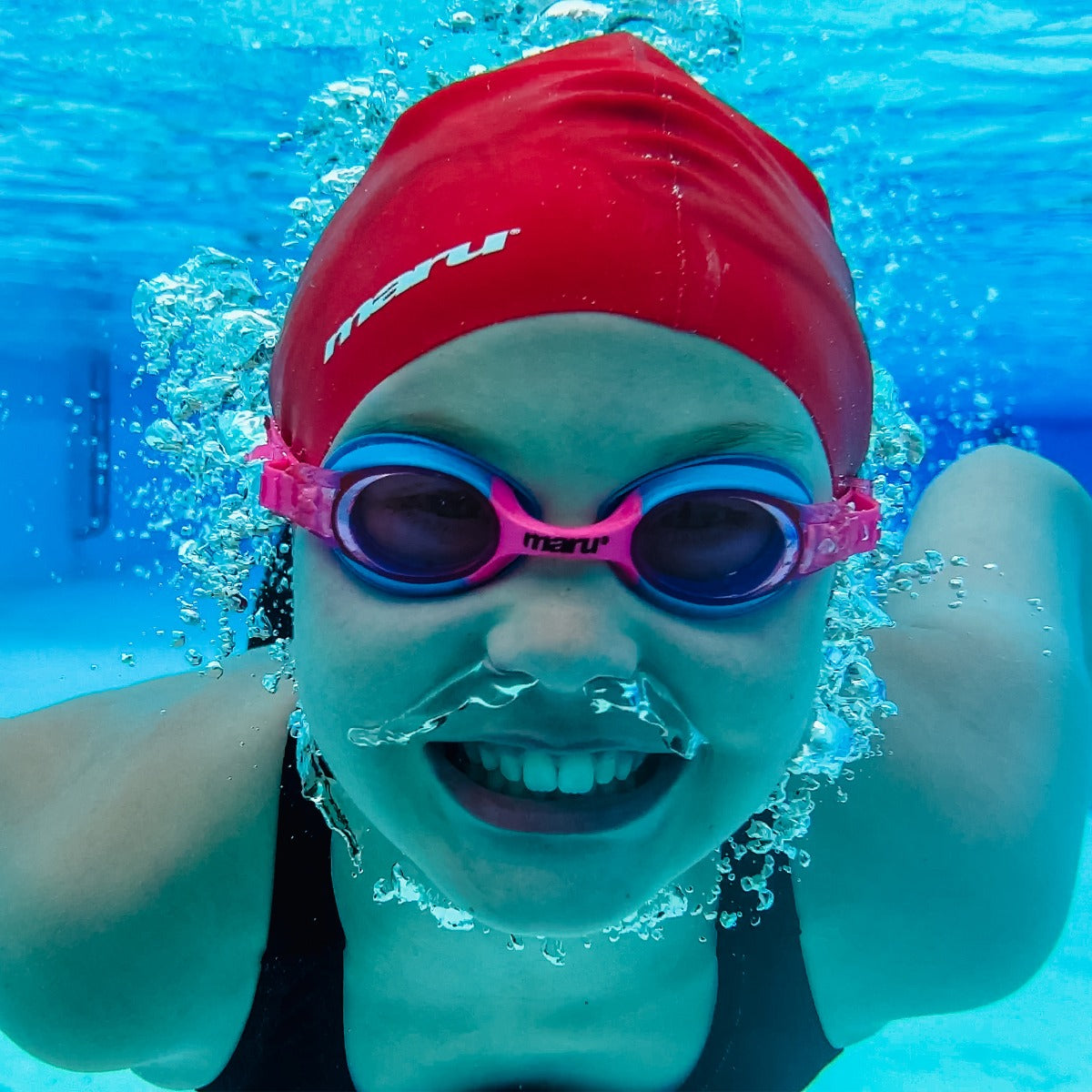
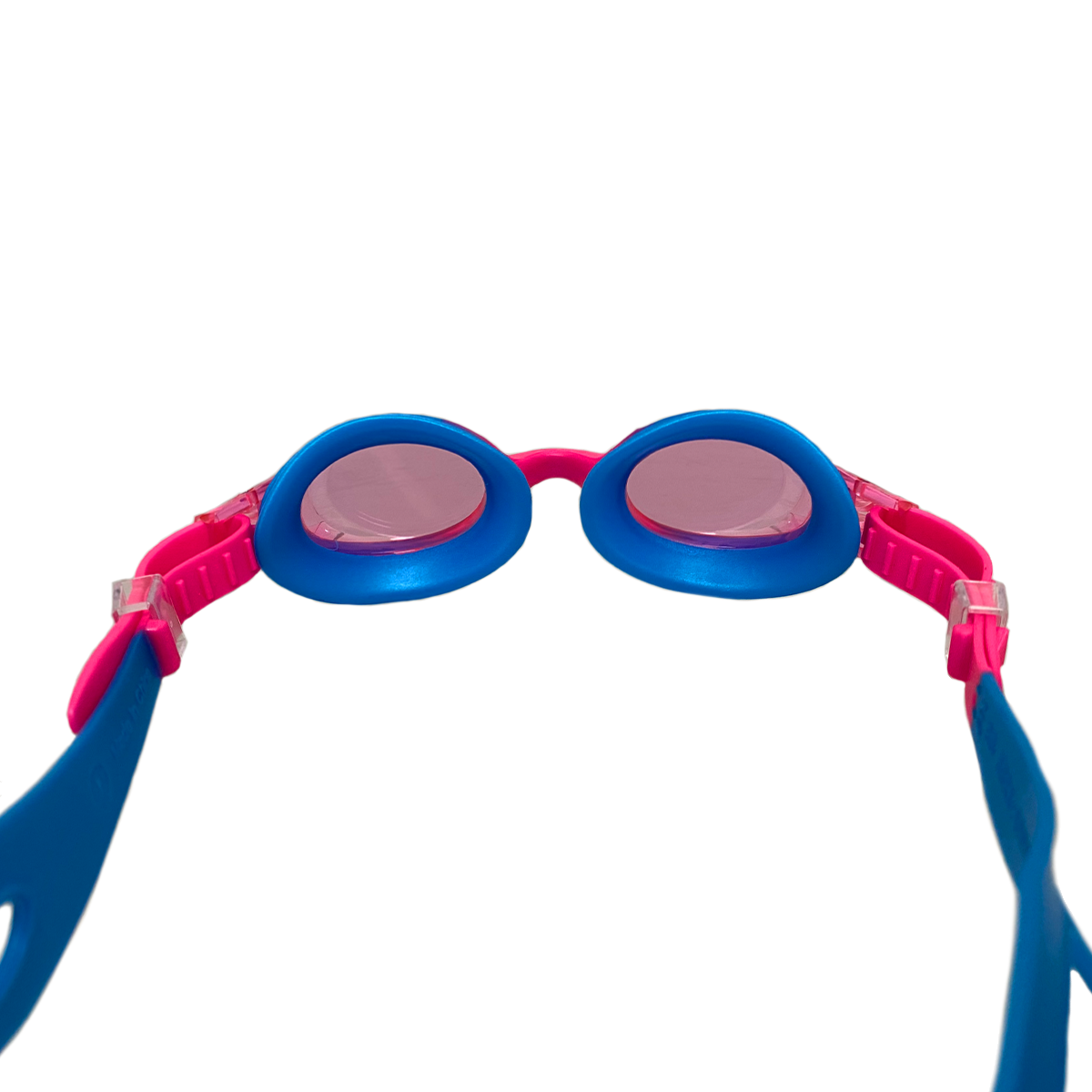
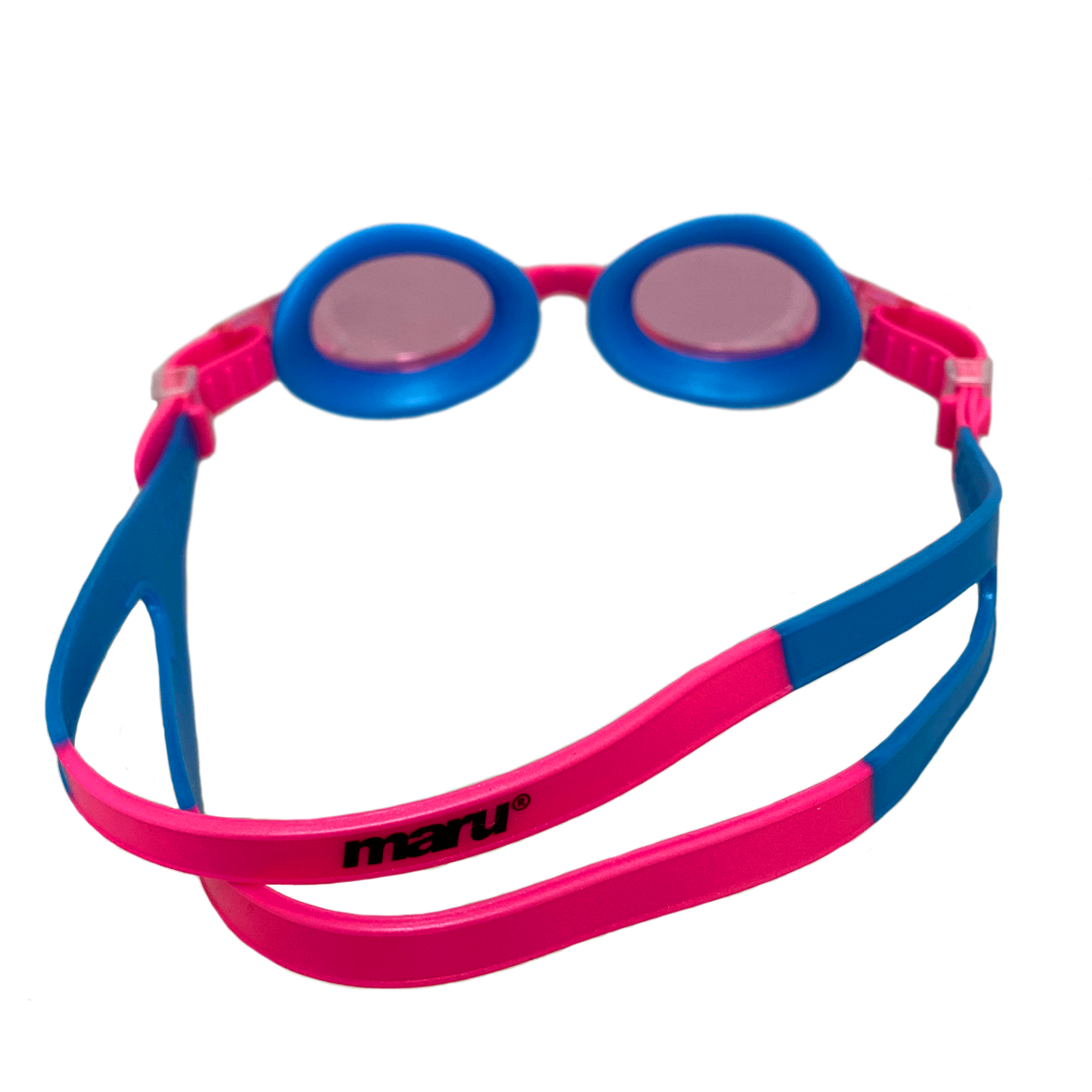
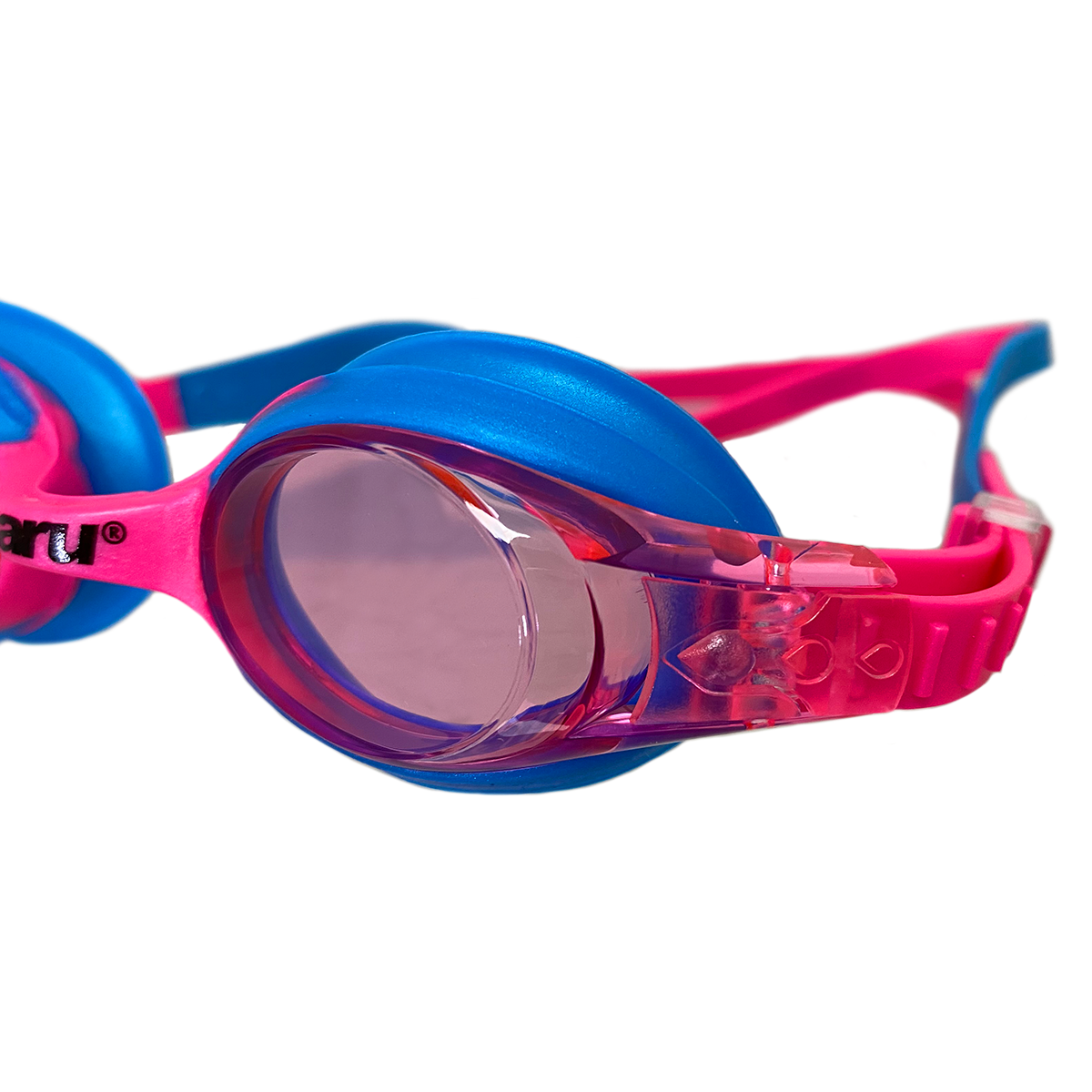
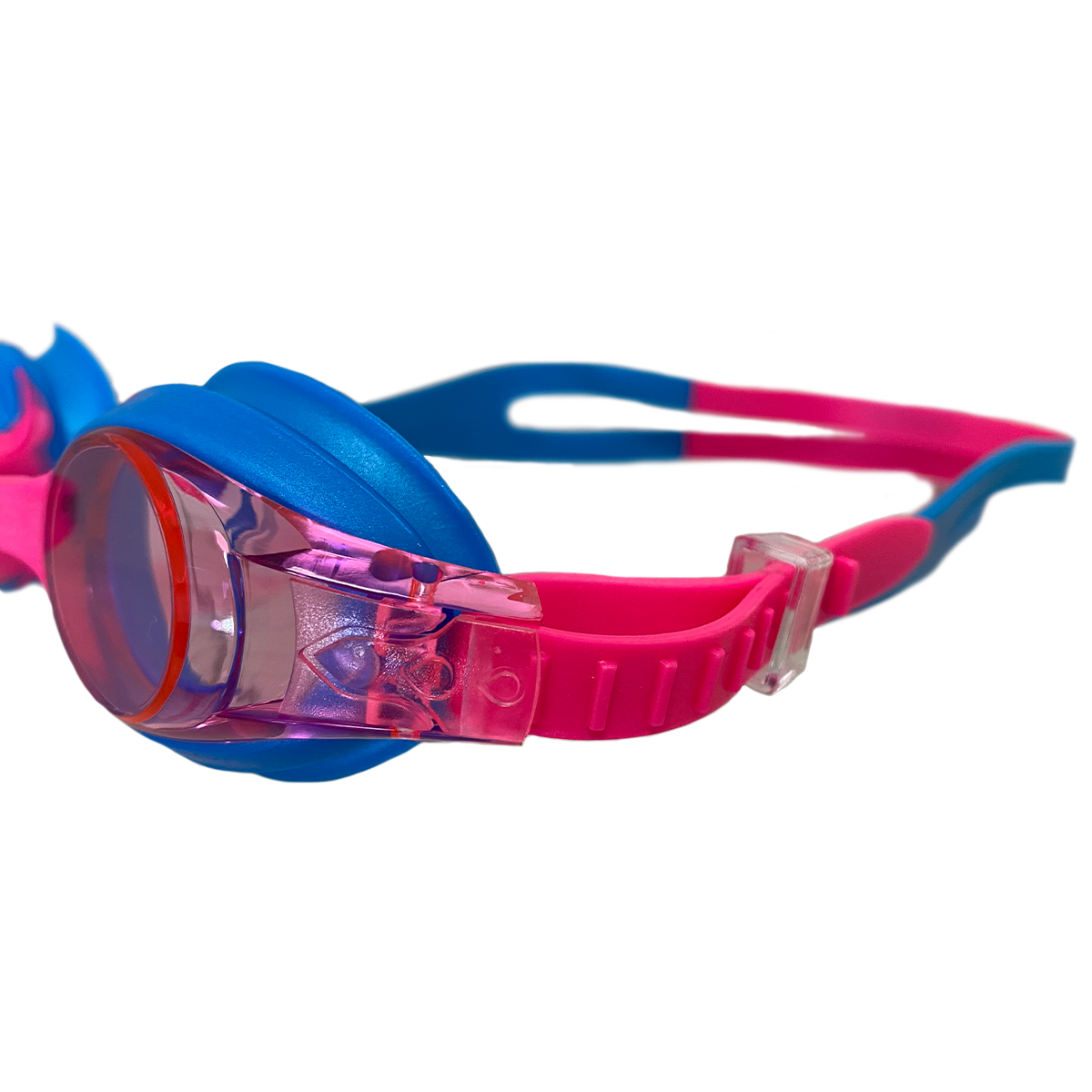
Antworten auf Ihre Fragen zur Maru Goggle
Einklappbarer Inhalt
Anleitung zur Verwendung von Schwimmbrillen
1. Die richtige Schutzbrille auswählen:
Wählen Sie eine Schutzbrille, die zu Ihrer Gesichtsform und -größe passt.
Achten Sie auf verstellbare Riemen und Dichtungen, um einen festen Sitz zu gewährleisten, ohne zu eng zu sein.
2. Vorbereitung:
Überprüfen Sie Ihre Schutzbrille vor dem ersten Gebrauch auf etwaige Schäden, wie etwa Kratzer oder Risse in den Gläsern oder Bändern.
Stellen Sie sicher, dass die Linsen sauber sind. Spülen Sie sie mit klarem Wasser ab, um Staub und Schmutz zu entfernen.
3. Anpassen des Riemens:
Setzen Sie die Schutzbrille auf Ihr Gesicht, ohne das Band festzuziehen.
Passen Sie den Nasensteg an, wenn Ihre Schutzbrille über eine einstellbare Funktion verfügt.
Sobald die Schutzbrille bequem auf Ihren Augen sitzt, stellen Sie die Bänder für einen festen Sitz ein.
Die Schutzbrille sollte Ihre Augen wasserdicht abdichten, ohne in Ihre Haut einzuschneiden.
Der Riemen sollte bequem auf Ihrem Hinterkopf über den Ohren sitzen.
4. Ins Wasser gehen:
Vergewissern Sie sich vor dem Eintauchen, dass Ihre Schutzbrille sicher sitzt.
Sie können die Linsen sanft gegen Ihre Augen drücken, um einen Sog zu erzeugen.
Gehen Sie langsam ins Wasser, um sich an die Temperatur zu gewöhnen und sicherzustellen, dass Ihre Schwimmbrille an ihrem Platz bleibt.
5. Schwimmtechniken:
Halten Sie beim Schwimmen Ihren Kopf in einer neutralen Position und Ihre Augen im Wasser, um eine bessere Sicht zu gewährleisten.
Passen Sie Ihre Schwimmbrille an, wenn sie sich beim Schwimmen löst oder unbequem wird.
6. Aussteigen aus dem Wasser:
Wenn Sie das Wasser verlassen, nehmen Sie die Schutzbrille vorsichtig ab und achten Sie darauf, nicht zu stark am Band zu ziehen.
7. Reinigung und Lagerung:
Spülen Sie die Schutzbrille nach jedem Gebrauch mit Süßwasser ab, um Chlor, Salzwasser und Schmutz zu entfernen.
Warum tragen Schwimmer eine Schwimmbrille?
Schwimmer tragen Schwimmbrillen, um ihre Augen vor dem Wasser zu schützen und beim Schwimmen eine klare Sicht zu bewahren. Poolwasser enthält oft Chlor, das die Augen reizen kann, und im offenen Wasser können Schwimmer auf Salz, Schmutz oder andere Reizstoffe treffen. Schwimmbrillen dichten die Augen ab, halten sie trocken und ermöglichen Schwimmern eine klare Sicht unter Wasser. Diese verbesserte Sicht ist wichtig, um die Richtung und Konzentration beizubehalten, insbesondere beim Wettkampfschwimmen. Sie machen das Erlebnis auch angenehmer und ermöglichen Schwimmern, sich voll und ganz auf ihre Leistung zu konzentrieren.
Sind zum Schwimmen Schwimmbrillen notwendig?
Eine Schwimmbrille ist nicht unbedingt erforderlich, macht das Schwimmen jedoch deutlich angenehmer. Mit einer Schwimmbrille können Sie auch unter Wasser klar sehen und Ihre Augen sind vor Dingen wie Chlor in Schwimmbädern oder Salz im offenen Wasser geschützt, die reizend wirken können. Während einige Gelegenheitsschwimmer vielleicht ohne sie auskommen, finden die meisten Menschen, insbesondere diejenigen, die häufig oder wettkampfmäßig schwimmen, sie sehr hilfreich, um konzentriert zu bleiben und ihre Zeit im Wasser zu genießen.
Helfen Schwimmbrillen beim Schwimmen?
Ja, Schwimmbrillen können beim Schwimmen definitiv hilfreich sein. Sie ermöglichen Ihnen eine klare Sicht unter Wasser, was besonders nützlich ist, um auf Kurs zu bleiben und Ihre Umgebung im Auge zu behalten. Schwimmbrillen schützen Ihre Augen auch vor Reizungen durch Chlor oder Salzwasser und machen das Schwimmen angenehmer. Durch die Reduzierung von Ablenkungen wie brennenden Augen oder verschwommener Sicht können Sie Ihr Schwimmerlebnis insgesamt genießen. Egal, ob Sie trainieren oder nur zum Spaß schwimmen, Schwimmbrillen können einen großen Unterschied machen.
Warum sind manche Schwimmbrillen verspiegelt?
Einige Schwimmbrillen haben verspiegelte Gläser, um Blendung zu reduzieren. Die reflektierende Beschichtung hilft, Sonnenlicht und grelles Innenlicht auszublenden, sodass Sie beim Schwimmen besser sehen und sich konzentrieren können. Verspiegelte Brillen werden oft von Wettkampfschwimmern bevorzugt, die unter unterschiedlichen Lichtbedingungen trainieren, da sie Ablenkungen auf ein Minimum reduzieren und eine bessere Sicht bieten. Außerdem können sie ein wenig Privatsphäre bieten, indem sie Ihre Augen verdecken, was manche Schwimmer mögen.
Was ist der Unterschied zwischen polarisierten und verspiegelten Gläsern?
Polarisierte Gläser in Schwimmbrillen reduzieren Blendung, indem sie horizontales Licht herausfiltern. Dadurch sind sie ideal für das Schwimmen im Freien bei hellen Bedingungen, da sie die Sicht verbessern und die Augenbelastung verringern. Verspiegelte Gläser hingegen haben eine reflektierende Beschichtung, die Lichteinwirkung und Helligkeit reduziert und eine dunklere Tönung bietet, die perfekt für helle Innenräume ist.
Ist es besser, mit einer Schwimmbrille zu schwimmen?
Das Schwimmen mit einer Schwimmbrille ist für die meisten Menschen im Allgemeinen besser. Sie schützt Ihre Augen vor Chlor, Salz und anderen Reizstoffen und macht das Schwimmen angenehmer. Außerdem ermöglicht Ihnen eine Schwimmbrille eine klare Sicht unter Wasser, sodass Sie den Überblick behalten und das Erlebnis mehr genießen können. Egal, ob Sie Bahnen schwimmen, trainieren oder einfach nur Spaß haben, das Tragen einer Schwimmbrille kann einen spürbaren Unterschied machen, da es die Augenbelastung verringert und es Ihnen ermöglicht, sich voll und ganz auf das Schwimmen zu konzentrieren.
Lieferung und Rückgaben
Kostenlose Lieferung ab £35
Standardlieferung (UK): In der Regel innerhalb von 3–5 Werktagen. Dieser Service ist kostenlos für Bestellungen über £35 und kostet £2,99 für Bestellungen unter £35.
Expresslieferung (UK) – £4,99: In der Regel innerhalb von 1–2 Werktagen. Bestellungen müssen bis 14:00 Uhr (Montag–Freitag) aufgegeben werden, um am selben Tag bearbeitet zu werden. Die Lieferung erfolgt dann von Montag bis Samstag. Bestellungen nach 14:00 Uhr am Donnerstag werden am Freitag versendet und am nächsten Werktag (Montag) geliefert.
Internationale Standardlieferung (Europa): In der Regel innerhalb von 3–5 Werktagen. Die Versandkosten sind dynamisch und werden beim Checkout angezeigt.
Internationale Standardlieferung (Rest der Welt): In der Regel innerhalb von 5–10 Werktagen. Die Versandkosten sind dynamisch und werden beim Checkout angezeigt.
Kostenlose Rücksendung im Vereinigten Königreich
Alle UK-Bestellungen sind für kostenlose Rücksendungen innerhalb von 14 Tagen berechtigt.
Für vollständige Details klicken Sie bitte hier.





